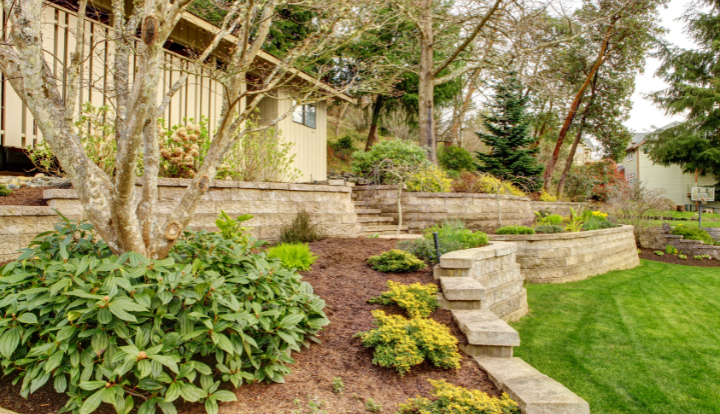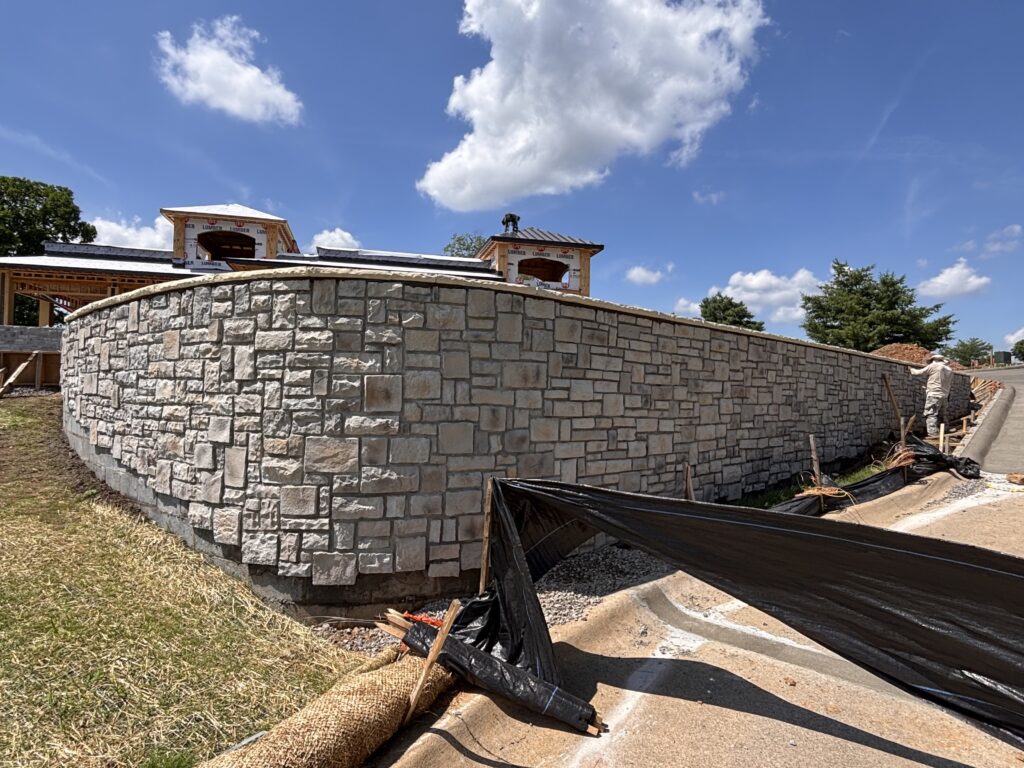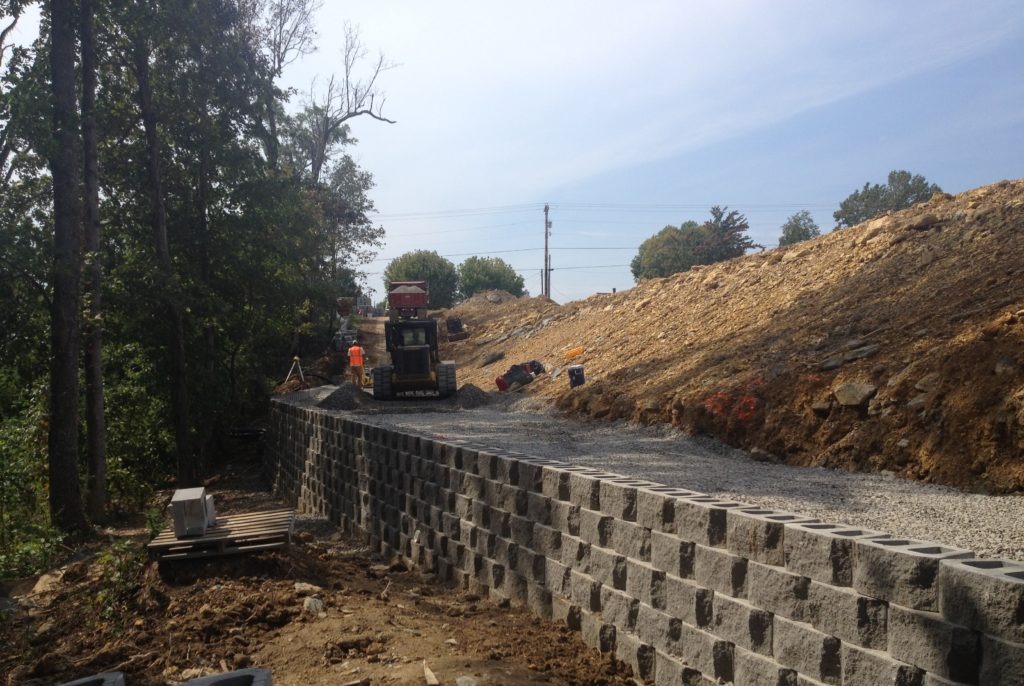Tennessee’s rolling hills and dramatic elevation changes make for beautiful views and complex landscaping. At Puryear Farms, we often say retaining walls are the hidden heroes of the yard. While your eye may go straight to a lush lawn or a custom patio, it’s often a well-built wall quietly doing the heavy lifting—literally.
From keeping soil in place to creating usable space on sloped lots, retaining walls are more than just functional. If you work with the right team, they can be beautifully crafted to match your home and landscape style.
Let’s break down what you need to know before installing one of your own.

Why Homeowners in Tennessee Need Retaining Walls
Middle Tennessee is known for its terrain, and that’s where retaining walls come in. Most of the time, homeowners reach out to us because:
- Their backyard slopes too steeply to use
- Rainwater is causing erosion or pooling issues
- They need to create a flat pad for a patio, pool, or garden
Whatever the reason, the goal is the same: createa safe, stable, and beautiful space.
The Puryear Approach: More Than Just Stacking Blocks
There’s a myth that building a retaining wall is just digging a trench and stacking blocks. The reality? It’s part engineering, part artistry.
At Puryear Farms, we start every project by understanding the why behind the wall—what it needs to hold back, what aesthetic you’re going for, and how it will function long term.
Here’s how our process works:
- Consultation – We visit your property, assess the slope, and talk about your goals.
- Design & Materials – From segmental block to cinder block with stone veneer, we help you choose the right product for your style and budget.
- Site Prep – We shoot grades, mark out the area, and ensure proper drainage and soil compaction.
- Build Out – With attention to detail (and geo-grid as needed), we construct your wall to last—because that’s what heroes do.
- Finishing Touches—Whether that’s lighting, capping, or matching veneer, we ensure that the finished wall blends seamlessly with your home.

What Are The Best Materials for Retaining Walls?
We build:
- Segmental Block Walls – Durable, cost-effective, and visually versatile.
- Cinder Block + Veneer – For a more custom look, especially when matching your home’s stone or brick façade.
- Railroad Tie or Timber Walls – These are less durable but sometimes desired for aesthetic or budget reasons.
- Boulder Walls – Occasionally used, though we advise caution based on Tennessee’s soil and drainage conditions.
Want to see how we transform a slope into a usable backyard? Check out our Project Gallery or explore our Design Services page.
Tennessee Soil + Water = The Need for Planning
Water is one of the most destructive forces your wall will face. That’s why proper drainage planning is built into every project. We include:
- Drainage pipes behind walls
- Gravel backfill
- Weep holes or exit ports
- Proper compaction
And we never build over 4 feet without factoring in tiered walls or local code requirements like handrails.
Not All Walls Are Created Equal
What sets our work apart is the level of care and expertise we bring to every project. We start with upfront planning, so there’s no guesswork involved.
Elevations are measured and mapped out before construction even begins. Our walls are built for longevity, using geo-grid reinforcement and engineering best practices to ensure lasting structural integrity.
We also know that a wall shouldn’t just function well, it should look great, too. That’s why we help you choose materials that not only perform but also complement your home’s aesthetic.
With decades of experience and hundreds of walls under our belt (many of which are still standing strong), our craftsmanship speaks for itself. We stand firmly behind the quality of our work!

Retaining Wall FAQs for Tennessee Homeowners
- What’s the average cost of a retaining wall in Tennessee?
Costs vary, but most residential projects range from $50 to $80 per square foot depending on materials, access, and drainage needs. - Do retaining walls need a permit in Tennessee?
Sometimes. Most municipalities require a permit or engineer approval if a wall exceeds 4 feet in height. - Can I build a retaining wall myself?
Sure, for small garden walls, sure. But for anything over 3 feet, we recommend a pro to avoid costly failure down the road. - How long do retaining walls last?
A well-built segmental wall can last 30+ years, especially with proper drainage. - What causes retaining walls to fail?
Poor drainage, lack of geo-grid, improper base preparation, or using the wrong materials for your soil type. - Will the wall settle or lean over time?
Some minor settling may occur, but we design walls to resist leaning or collapse through proper base prep and drainage. - Can you match my home’s brick or stone?
Yes. Cinder block + stone veneer is a popular choice for blending seamlessly with your home. - Do you do drainage assessments too?
Yes. Drainage is part of every wall project, and we offer standalone drainage consultations. - Do you handle both design and build?
Absolutely. Our team handles everything from concept to construction. - Do you offer other hardscaping services?
Yes! Explore our outdoor living services here, including patios, fire pits, and outdoor kitchens.
Give Your Landscape Its Unsung Hero
If you’re tired of the slope stealing your space, or worried about water creeping toward your foundation, a retaining wall might be the solution. Let’s build one that looks good, lasts long, and makes your life easier.
Ready to start your quote? Contact us here.
